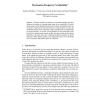12597 search results - page 36 / 2520 » Complexity of Mechanism Design |
ACMICEC
2006
ACM
15 years 6 months ago
2006
ACM
Auction mechanism design has traditionally been a largely analytic process, relying on assumptions such as fully rational bidders. In practice, however, bidders often exhibit unkn...
97
Voted
SIGECOM
2004
ACM
15 years 6 months ago
2004
ACM
Often, an outcome must be chosen on the basis of the preferences reported by a group of agents. The key difficulty is that the agents may report their preferences insincerely to m...
90
Voted
AAAI
2007
15 years 3 months ago
2007
In most mechanism design settings, optimal general-purpose mechanisms are not known. Thus the automated design of mechanisms tailored to specific instances of a decision scenario...
84
Voted
COCOA
2007
Springer
15 years 7 months ago
2007
Springer
This paper attends to the problem of a mechanism designer seeking to influence the outcome of a strategic game based on her creditability. The mechanism designer offers additional...
100
click to vote
ISPAN
2005
IEEE
15 years 6 months ago
2005
IEEE
In classical mechanism design setting the outcome of the mechanism is computed by a trusted central party. In this paper we consider distributed implementations in which the outco...

